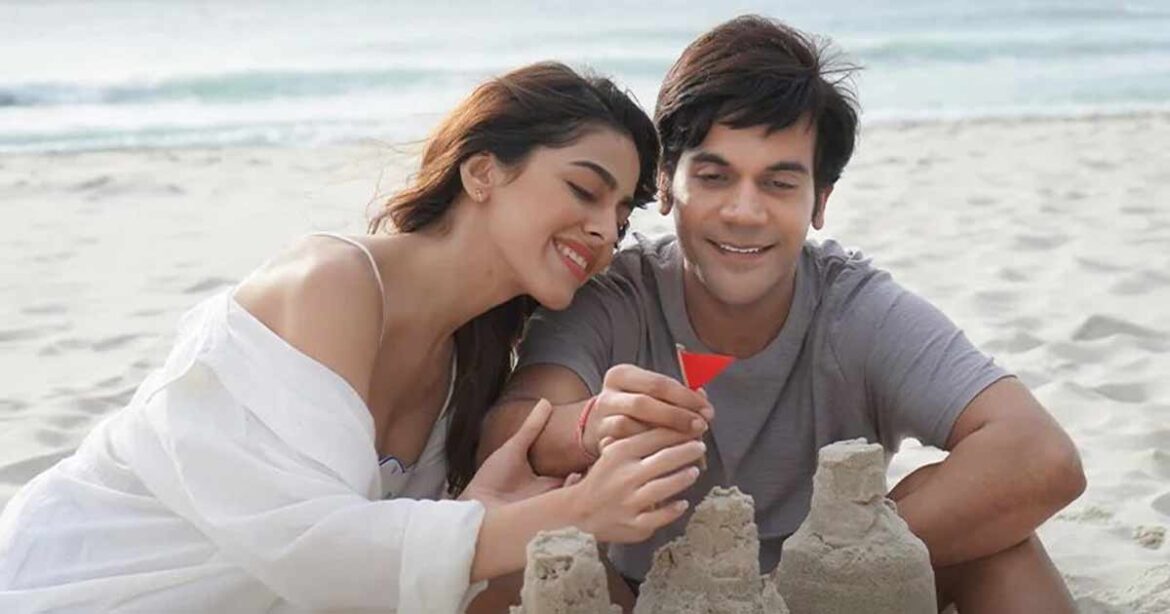Courage All The Way:
The achievements of Srikanth Bolla are so remarkable, it’s a wonder a biopic was not attempted earlier. It is perhaps the OTT effect that has made it possible for the stories of real-life winners — not just war heroes– to be brought to the screen, and Bolla is by any measure a poster boy of unflinching determination and never taking no for an answer.
Hindi cinema has, with a few exceptions like Sparsh (1980) or Aankhen (2002) used visual impairment of a character as an excuse for melodrama or pity mongering. So Tushar Hiranandani’s matter-of-fact approach towards his protagonist, Srikanth (Rajkummar Rao) is refreshing. That may have had something to do with the impression the real character conveys to people – as his screen alter ego says, blind people deserve not just empathy but equality.
Born visually deprived in a small Andhra village, and named Srikanth, after the cricketer, by his father (Srinivas Beesetty), elated at the birth of a son, till he is told to look at the infant’s eyes. Then he is all too ready to bury him alive, rather than take on the burden of looking after a disabled child. After this scene, it seems rather unfair that the song Papa Kehte Hain from Qayamat Se Qayamat Tak (1988) be used as the theme song of this film!
The kid (Arnav Abdagire) is not just a genius at studies, he is also scrappy, quick to brawl with bullies; as he says, since he cannot run, he might as well fight. This swagger stays with Srikanth when he is sent to a school for the visually challenged in Hyderabad, where a teacher, Devaki (Jyothika) teaches the children that they can do anything they put their minds to. She takes on the role of his guardian, and encourages him to reach his full potential. So Srikanth (Rajkummar Rao) tops the class, he excels at cricket, and never lets his disability hamper him in any way. Indian society still sees him as a lesser being, so he and Devika have to fight a legal battle so that Srikanth can be admitted to a science course. He impresses President APJ Abdul Kalam (Jameel Khan) by saying that he wants to be India’s first visually-challenged president. Srikanth’s can-do spirit is inexhaustible.
When he has the requisite scores and the IITs still refuse him admission, he applies and gets into the coveted MIT in the US on a scholarship. The airlines have a rule that visually challenged people cannot travel alone, and of course, he proves he can!
The film (written by Jagdeep Sidhu and Sumit Purohit) makes it appear as if the US is a haven for the disabled; Srikant faces no problems or discrimination and is happy there. He also meets a medical student, Swathi (Alaya F), who suggests that he return to India and work for the welfare of others like himself, who may not have gotten the help and encouragement he did.
In India, he finds that there are no job opportunities even for a topper like him, so decides to set up his own business and employ people with disabilities. He gets the help of a generous investor, Ravi (Sharad Kelkar) and turns Bollant Industries into a success.
Again, the visually-challenged have mostly been portrayed in Hindi films either as victims of fate or wearing the saintly halo of fortitude; Hiranandani does not hesitate to show the unlikeable side of Srikanth and his arrogance. However, the director also seems to have worked with a checklist of hurdles Srikanth encountered and resolved them too easily. There are a few scenes that honestly portray the challenges Srikanth must have faced—the scene where he is thrown on the street without his stick, or the one where he pleads for help at the airport are truly poignant. It could not have been easy for him, at the same time, his unshakable resilience does not allow the film version of Bolla’s life to be turned into a tearjerker.
Rajkummar Rao is usually competent, but in this role, he has given a performance that is deeply observed— the expressions, the gait, everything is just right. He dominates every scene with his look of utter concentration and purpose, with just a tinge of vanity. Jyotika brings warmth and Sharad Kelkar charm to their characters, as they willingly allow themselves to bend to Srikanth’s steely will, Alaya F has a brief and mostly unremarkable role. The film is so earnest, so sunshine-y, the hero so inspiring, that one could overlook the slight sags along the two-hour runtime.
(This piece first appeared in scroll.in)

